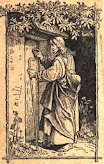The Apostles Creed
The Apostles Creed
I believe in God, the Father Almighty, Creator of Heaven and earth; and in Jesus Christ, his only Son, our Lord; who was conceived by the Holy Spirit. born of the Virgin Mary,He suffered under Pontius Pilate, was crucified, died and was buried. He descended into hell; the third day He rose again from the dead; he ascended into Heaven sits at the right hand of God, the Father almighty; from there he will come to judge the living and the dead. I believe in the Holy Spirit, the Holy
Catholic Church, the Communion of Saints, the forgiveness of sins, the resurrection of the body, and life everlasting. Amen.
Catholic Church, the Communion of Saints, the forgiveness of sins, the resurrection of the body, and life everlasting. Amen.
Throughout the Middle Ages, it was generally believed and accepted that this Apostles’ Creed was composed jointly by the twelve Apostles in Jerusalem, with each of the twelve contributing one clause of the Creed before embarking on their respective missions. This legend dates back to the 4th century.
Today, this is a point of argument and debate, especially within the ranks of the Protestant scholars.
Nevertheless, many continue to think of this creed as apostolic in nature because its basic teachings are agreeable to the theological formulations of the Apostolic Age. The Catholic Church does not hold a position one way or the other on this subject; however, it does hold that all of the points of the Creed are part of the Catholic Faith. Most of the western Christian faiths today profess the Apostles’ Creed as their core tenants of faith of Christianity.
Over history, the Apostles’ Creed functioned in many ways in the life of the Catholic Church:
$ In the early Church, it was a confession of faith necessary for those to be baptized.
$ Catechetical instruction was based on the major tenets of the creed. This was necessary, because many of the new Christians were not able to read and write; this, almost poetic, Creed was easy to memorize and make part of everyday life.
$ In time, the Apostles’ Creed became a “rule of faith” to clearly separate the true faith from heretical deviations.
$ By the 6th or 7th century the Creed had come to be accepted as a part of the official liturgy of the Church.
$ Finally, it was used, along with the Lord’s Prayer, by devout individuals as a part of their morning and evening devotions. The Apostles’ Creed contains three paragraphs, one for each person of the Trinity.















